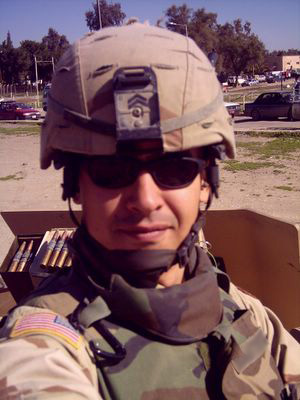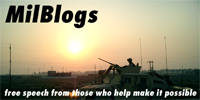Some Patience, Please...
Now, my wife will laugh when she reads this, because when it comes to some things, I am NOT the most patient individual around -- not by a long shot. But I believe a little patience is called for here.
I have seen, over the past couple of days, items in the news that are to this effect: "One Year After Sovereignty, Iraq Still Violent" or "Iraq: A Year Later...What Has Changed?" (These are not quotes, but generalizations of what I have seen or heard.) Come on, people, gimme a break... do you mean to tell me that you expect to see earth-shattering change in 12 months???
We live in a world of instant and nearly-instant gratification. Look at what we have... the internet, cellular telephones, instant messenger, ATMs, the fast-food drive-through; in some states there are even drive-through liquor stores. We have NetFlix, a service which sends DVDs to you; eBay, where one might buy practically ANYTHING. You can buy food online or through the telephone and have it delivered quickly, whether it be raw groceries or prepared food. Information through the internet is at your fingertips -- I mean, you are reading this, aren't you?
None of the things I have listed above are in and of themselves bad things. Convienience is, well, convienient. But it has conditioned us to be impatient beings. We want what we want NOW. This is why we are seeing the outcry from the Left and the attempt to label our endeavor here in Iraq and elsewhere a "quagmire."
A lesson in patience is in order. Again, my wife would not say I am the one to give it. Ibrahim Al-Jaafari, the current Prime Minister of Iraq, said "You cannot fix in six months what took 35 years to break." Think about that.
There are hundreds of things that are better in this country, just ask Arthur Chrenkoff, who compiles a bi-monthly list of good things happening here. There are hundreds of things that need work. These things take TIME. These things take EFFORT. To this effort we must continue to add RESOLVE and PATIENCE. In the grand scheme of things, the two years that have passed since the end of 'major' hostilities, in all reality, is a very short time to reestablish a nation.
Chrenkoff also brings to our attention an op-ed piece written by PM Al-Jaafari, found here. Immediately below, you will find the entire text of his piece:
LAST week I was at Blair House in the centre of Washington, DC. In this house is the table on which George Marshall in June 1947 signed the plan to pump today's equivalent of $US500 billion ($647 billion) into the impoverished economies of Europe as an investment against future conflict. The plan was controversial but nobody would now deny its far-sightedness.
Nazism gave way to a lasting democracy, economic devastation was replaced by slow but sure progress towards economic regeneration. Consider the Germany of 1945 and the Germany of today: which would you rather have as your neighbour?
Last week I went to Brussels with an Iraqi delegation for a conference with foreign ministers of more than 80 countries. All have agreed to help Iraq towards a better future. On Friday I met President George W. Bush; today I will meet Tony Blair. Both have decisively chosen to back freedom and democracy in Iraq. They are right to have done so. It is not just a matter of principle but of the security of their own countries. Terrorism knows no boundaries; it strikes all over the world. Democracy, transparency and justice in the Middle East will dry up the wellsprings of hatred and terrorism and bring security to Europe and the US.
Terrorists are criminals and must be tried as such. But dealing with the spread of terrorism in the Middle East is more complex, as it thrives on ignorance, hate ideologies and the political failures of modern states.
Arabs are better educated in technical sciences, engineering and languages than in contemporary political and social sciences. Political education in the Middle East is usually indoctrination. By contrast, Iraq's recent electoral experience enlightened millions. It showed that education is to vote a government into power, then watch it grapple with the issues that confront people in their daily lives and see whether it succeeds or fails, and listen to it explain its policies honestly and frankly. A free press leaves people able to discriminate between propaganda, rumours and lies and the unvarnished reporting of facts.
Perhaps those elections can be an education also for the people of Western democracies. They can see that, like them, Iraqis want to choose their own leaders and are entirely capable of running fair elections and respecting the result. They can also see that there is nothing to fear if people choose to vote for an Islamic party.
I am not only the first democratically elected leader of an Arab country, I am also the first prime minister in the Middle East to come from a religious, Islamic opposition movement at the head of a diverse ethnic and political alliance. Embracing diversity within human society is not just a political necessity, it is rooted in my faith. Islam teaches that there is no compulsion in religion and that freedom of choice is divinely granted; it is dictators who need to cater to fanatics to stay in power.
Saddam Hussein is a case in point. He passed laws to limit religious freedom and degraded women's lives. I will reverse Saddam's legacy and welcome Iraq's diversity. I welcome the strong contribution that women can make in the workplace and in political life, where they make up one-third of our National Assembly, more than in most Western democracies.
Marshall said: "Our policy is not directed against any country or doctrine but against hunger, poverty, desperation and chaos." Today is the time for a new international Marshall Plan for Iraq and the broader Middle East, directed not for or against any policy but against ignorance, tyranny, hatred and anarchy.
Marshall repaired the decaying infrastructure of Germany after six years of war and 12 years of Nazi rule. In Iraq we have had nearly 40 years of fascist rule and have been in practice at war for half that time. I have seen throughout Iraq the marks of economic collapse and depredation this has left. Iraq today has few English speakers, it has hundreds of thousands of ex-soldiers trained for nothing but war and its universities, which once enjoyed a worldwide reputation, lag behind those in the rest of the region. It has debts totalling hundreds of billions of dollars and there has been no investment in its infrastructure for more than 20 years.
Three generations of Iraqis have grown up under a dictatorship, learning to take orders but not take initiatives or responsibility, and educated in religious and political hatred and isolationism. My people are a strong people; their will survived. The marks of Saddam's brutal and divisive rule, however, will take time to heal. Many of my people, as well as soldiers from the multinational force, are still being killed by terrorism.
The way will not always be easy. I am confident, though, that the prosperous democracies of the world will be as far-sighted today as Marshall was in 1947. Much blood had to be shed and money spent before peace was achieved in Europe. In Iraq the fight for democracy has cost hundreds of thousands of lives.
In the long run, however, it can secure centuries of peace and prosperity. Iraq's fight against terrorist networks and training camps, and the poverty and ignorance that supply them, has become the world's fight for the security of humanity.
Ibrahim Al-Jaafari
'Nuf said.
SCOUTS OUT!!!!!!
MDG......OUT.



